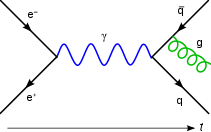
Back Propagator German Propagilo Esperanto Propagador Spanish Propagateur de l'équation de Schrödinger French פרופגטור HE Propagátor Hungarian Propagatore Italian プロパゲーター Japanese 전파 인자 Korean Propagator NB
| Quantum field theory |
|---|
 |
| History |
In quantum mechanics and quantum field theory, the propagator is a function that specifies the probability amplitude for a particle to travel from one place to another in a given period of time, or to travel with a certain energy and momentum. In Feynman diagrams, which serve to calculate the rate of collisions in quantum field theory, virtual particles contribute their propagator to the rate of the scattering event described by the respective diagram. Propagators may also be viewed as the inverse of the wave operator appropriate to the particle, and are, therefore, often called (causal) Green's functions (called "causal" to distinguish it from the elliptic Laplacian Green's function).[1][2]
- ^ The mathematics of PDEs and the wave equation, p 32., Michael P. Lamoureux, University of Calgary, Seismic Imaging Summer School, August 7–11, 2006, Calgary.
- ^ Ch.: 9 Green's functions, p 6., J Peacock, FOURIER ANALYSIS LECTURE COURSE: LECTURE 15.